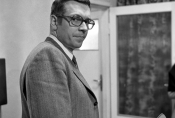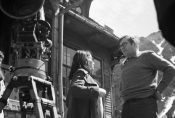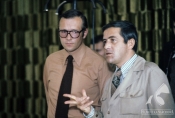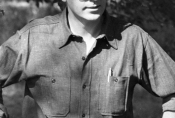Krzysztof Zanussi

Director, writer, producer. He was born on June 17, 1939, in Warsaw. He studied physics at the University of Warsaw (1955-1959) and philosophy at Jagiellonian University (1959-1962).
In 1966, he graduated from the Directing Department of the State Film School in Łódź. At the turn of the 1950s and 1960s, he was an active member of the amateur film movement and co-founder of the first Film Club "Po prostu", as well as the author of several award-winning amateur films (including Tramwaj do nieba/A Tram to Heaven, 1958). In 1965, he made his diploma film Śmierć prowincjała/Death of a Provincial, the story of the spiritual quest of a young art historian (awarded at festivals in Valladolid, Moscow and Mannheim).
His debut was the film Struktura kryształu/The Structure of Crystal (1969), which stood out in terms of its aesthetics (it was based on improvised situations and dialogues) and themes (the confrontation between the two opposing attitudes of the scholar characters). For this film, he received awards at festivals in Mar del Plata, Valladolid, Panama and Colombo. His next projects were: Życie rodzinne/Family Life (1971), about a failed return to the family home and the need to make ammends with the past, the intimate TV drama Za ścianą/Behind the Wall (1971, Grand Prix at the Festival of San Remo) and Hipoteza/Hypothesis (1972). His subsequent film Iluminacja/Illumination (1973, Grand Prix at festivals in Ravenna and Locarno, Special Jury Award at the Polish Film Festival in Gdansk) reinforced the image of a director who uses film to depict the philosophical, moral and spiritual quests of a contemporary intellectual, confronting them with the everyday reality of communist Poland. His subsequent films confirm this: Bilans kwartalny/ Quarterly Balance Sheet (1974, award at the Berlin Film Festival), Barwami ochronnymi/The Camouflage (1976, Grand Prix at the Festival in Gdansk, the film which launched the cinema of moral anxiety), Spirala/Spiral (1978, award for best director at the festival in Panama) and Constans (1980, awards at festivals in Panama, Cannes and Gdansk). His protagonists are often faced with the necessity of choice. Zanussi’s films featured outstanding performances by Maja Komorowska and Zbigniew Zapasiewicz. In the 1980s, Zanussi made several films in Germany.
In 1981, he made Da un paese lontano: Giovanni Paolo II/From a Far Country – the story of the life of Karol Wojtyła set against the backdrop of Polish history. In 1996, he made the autobiographical Cwał/Gallop (awarded in Gdynia and Tokyo), and later the TV series Opowieści weekendowe/ Weekend Tales (1996-2000). Next, he made Życie jako śmiertelna choroba przenoszona drogą płciową/Life as a Fatal Sexually Transmitted Disease (2000), the story of a doctor who is terminally ill with cancer, which can be traced back to Spirala/Spiral. The film addresses issues such as the inevitability of death and the necessity of dying. It won awards at festivals in Moscow and Gdynia (Grand Prix). Two years later, he made Supplement (2002), continuing the selected themes of Life... In 2005, he made the film Persona non grata, about a Polish Ambassador who must confront the past of the 1980s (Special Jury Award in Gdynia), then Serce na dłoni/And a Warm Heart (2008) and Rewizyta/Revisited (2009), which summarises the achievements of the first years of Zanussi's career.
He also directed in theatres in Poland and abroad (Krakow, Warsaw, Milan, Palermo, Paris, Rome, Bremen, Basel), primarily staging plays by European playwrights.
He was the chairman of the Polish Federation of Film Clubs (1975-1977). In 1980, he was elected head of the "Tor" Film Studio (he holds this position to this day). He is an activist of the FERA Federation (chairman since 1990), consultant to the Pontifical Commission for Culture at the Vatican, a member of the European Film Academy and the Pontifical Academy of Fine Arts and Literature, the Polish PEN Club and the Association of Writers. He has served as the chairman of the Eurovisioni Association.
He was honoured with numerous awards, including the Commander's Cross with Star of the Order of Polonia Restituta for outstanding contribution to Polish culture and achievements in arts (1999) and the Officer's Cross of the Order of Merit of the Italian Republic (2006).
In 1992, he received the title of professor at the University of Silesia in Katowice. He has also been teaching at the State Film School in Łódź and the National Film School in the UK. He holds honorary doctorates from several universities in Eastern Europe. He is the author of several books, as well as collections of scripts and film novellas.
Selected filmography
-
1969
THE STRUCTURE OF CRYSTAL
-
1972
ILLUMINATION
-
1976
CAMOUFLAGE
-
1995
AT FULL GALLOP
Articles
-
Head of Medusa, or realism in films of the Cinema of Moral Anxiety
Marcin Maron
„Kwartalnik Filmowy” – Special Issue 2013: “Polish Film Scholars on Polish Cinema”













